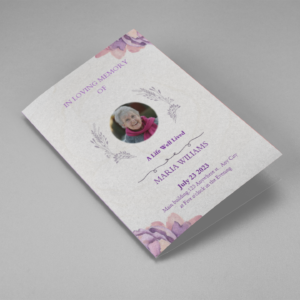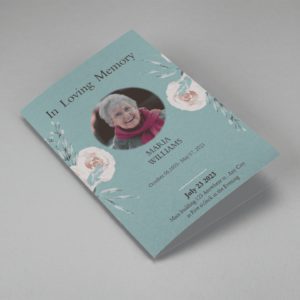“How Obituaries Are Written” is the first very first question that arises at the time of writing an obituary or creating an obituary. To know the answer to this question you must know about the term used “obituary”.
Honoring the lives of our loved ones is an essential part of the grieving process. One powerful way to pay tribute to their memories is through the art of writing obituaries. In this blog post, we will delve into the intricacies of composing obituaries and explore the techniques to create heartfelt and informative tributes. Additionally, we will highlight the role of QuickFuneral.com in assisting families during these challenging times.
Table of Contents:
- The Purpose and Importance of Obituaries
- Understanding the Structure of an Obituary
- Crafting an Engaging Obituary: Key Elements
3.1. Opening Sentences: Captivating the Reader
3.2. Biographical Information: Painting a Portrait
3.3. Highlighting Achievements and Passions
3.4. Sharing Personal Anecdotes: Connecting with Readers
3.5. Funeral and Memorial Service Details: Honoring the Deceased
- Writing Style and Tone: Striking the Right Balance
- Tips for Writing Compelling Obituaries
5.1. Gather Information and Stories
5.2. Emphasize the Unique Qualities of the Deceased
5.3. Seek Feedback and Edit with Care
- QuickFuneral.com: A Helping Hand in Difficult Times
6.1. Obituary Templates and Resources
6.2. Professional Assistance and Guidance
- Conclusion
1. The Purpose and Importance of Obituaries:
Obituaries serve as a lasting tribute, documenting the lives and legacies of those who have passed away. They provide a platform for loved ones to share memories, express condolences, and inform the community about funeral arrangements. Obituaries offer solace to grieving families and create a sense of connection among readers.
2. Understanding the Structure of an Obituary:
Typically, obituaries consist of several essential components, including the name of the deceased, biographical information, achievements, personal anecdotes, funeral service details, and information about surviving family members. Understanding this structure can help ensure a comprehensive and well-rounded tribute.
3. Crafting an Engaging Obituary: Key Elements:
3.1. Opening Sentences: Captivating the Reader:
Begin the obituary with a powerful and engaging opening sentence to capture the attention of readers. This initial impression will set the tone for the rest of the tribute.
3.2. Biographical Information: Painting a Portrait:
Include relevant biographical details such as the full name, age, date of birth, and place of residence. This information provides a framework for the reader to understand the individual’s background and context.
3.3. Highlighting Achievements and Passions:
Outline the accomplishments, hobbies, and interests of the deceased. Highlighting their achievements and passions showcases their unique qualities and leaves a lasting impression on readers.
3.4. Sharing Personal Anecdotes: Connecting with Readers:
Incorporate personal anecdotes, stories, and memories that reflect the character and spirit of the departed. These intimate details help readers form a deeper connection with the individual and create a more meaningful tribute.
3.5. Funeral and Memorial Service Details: Honoring the Deceased:
Include information about the funeral or memorial service, including the date, time, location, and any special requests from the family. This allows readers to pay their respects and support the grieving family during this difficult time.
4. Writing Style and Tone: Striking the Right Balance:
Obituaries should strike a balance between being respectful, heartfelt, and informative. Employ a tone that reflects the personality and spirit of the deceased while ensuring the content remains clear and accessible to readers.
5. Tips for Writing Compelling Obituaries:
5.1. Gather Information and Stories:
Talk to family members, friends, and colleagues to gather comprehensive information about the deceased. Collect stories, anecdotes, and significant life events that help shape the obituary.
5.2. Emphasize the Unique Qualities of the Deceased:
Focus on the distinct attributes, passions, and accomplishments that made the individual special. This allows readers to celebrate their unique qualities and understand the impact they had on others.
5.3. Seek Feedback and Edit with Care:
Share the draft obituary with family members and close friends to ensure accuracy and capture additional memories. Edit the content carefully, paying attention to grammar, tone, and overall flow.
6. QuickFuneral.com: A Helping Hand in Difficult Times:
6.1. Obituary Templates and Resources:
QuickFuneral.com provides a range of obituary templates and resources to assist families in crafting meaningful tributes. These templates serve as a helpful starting point and can be customized to reflect the individual’s life and personality.
6.2. Professional Assistance and Guidance:
For those who require additional support, QuickFuneral.com offers professional assistance from experienced writers who understand the nuances of writing obituaries. They can provide guidance, help gather information, and ensure the obituary meets the family’s needs.
7. Conclusion:
Writing obituaries is both an art and a responsibility. By crafting heartfelt and informative tributes, we honor the lives of our loved ones and provide comfort to grieving families. Remember, QuickFuneral.com stands ready to support you during this challenging time, providing resources, templates, and professional assistance to help you create a fitting tribute for your departed loved one.
Obituary Templates
-
Searching for a Oak Leaf With Gold Oval Frame Half Page Funeral Program that is easy to print and amass and has a cutting-edge look? The Oak Leaf With Gold Oval Frame Half Page Funeral Program is the Perfect decision because it measures 8.5”x 5.5”.
- No Limitation on Content, Edit anything
- Edit anytime – unlimited revisions even after purchased
- Get a printable PDF downloaded to get it printed on your own.
-
Searching for a Brown and White Classic Funeral Program Half Page Program that is easy to print and amass and has a cutting-edge look? The Brown and White Classic Funeral Program Half Page Program is the Perfect decision because it measures 8.5”x 5.5”.
- No Limitation on Content, Edit anything
- Edit anytime – unlimited revisions even after purchased
- Get a printable PDF downloaded to get it printed on your own.
-
Searching for a Purple Elegant Watercolor Half Page Funeral Program Template that is easy to print and amass and has a cutting-edge look? The Purple Elegant Watercolor Half Page Funeral Program Template is the Perfect decision because it measures 8.5”x 5.5”.
- No Limitation on Content, Edit anything
- Edit anytime – unlimited revisions even after purchased
- Get a printable PDF downloaded to get it printed on your own.
-
Searching for a Cream and Green Photo Obituary Half Page Program that is easy to print and amass and has a cutting-edge look? The Cream and Green Photo Obituary Half Page Program is the Perfect decision because it measures 8.5”x 5.5”.
- No Limitation on Content, Edit anything
- Edit anytime – unlimited revisions even after purchased
- Get a printable PDF downloaded to get it printed on your own.
-
Searching for a Cream Simple Elegant Photo Church Half Page Program that is easy to print and amass and has a cutting-edge look? The Cream Simple Elegant Photo Church Half Page Program is the Perfect decision because it measures 8.5”x 5.5”.
- No Limitation on Content, Edit anything
- Edit anytime – unlimited revisions even after purchased
- Get a printable PDF downloaded to get it printed on your own.
-
Searching for a Samovar Silver Half Page Funeral Program Template that is easy to print and amass and has a cutting-edge look? The Samovar Silver Half Page Funeral Program Template is the Perfect decision because it measures 8.5”x 5.5”.
- No Limitation on Content, Edit anything
- Edit anytime – unlimited revisions even after purchased
- Get a printable PDF downloaded to get it printed on your own.
-
Searching for an Elegant Beige Half Page Funeral Program Template that is easy to print and amass and has a cutting-edge look? The Elegant Beige Half-Page Funeral Program Template is the Perfect decision because it measures 8.5”x 5.5”.
- No Limitation on Content, Edit anything
- Edit anytime – unlimited revisions even after purchased
- Get a printable PDF downloaded to get it printed on your own.
-
Searching for a White Floral Pro Half Page Funeral Program Template that is easy to print and amass and has a cutting-edge look? White Floral Pro Half Page Funeral Program Template is the Perfect decision because it measures 8.5”x 5.5”.
- No Limitation on Content, Edit anything
- Edit anytime – unlimited revisions even after purchased
- Get a printable PDF downloaded to get it printed on your own.
-
Searching for a Grey and Burgundy Elegant Half Page Funeral Program Template that is easy to print and amass and has a cutting-edge look? Grey and Burgundy Elegant Half Page Funeral Program Template is the Perfect decision because it measures 8.5”x 5.5”.
- No Limitation on Content, Edit anything
- Edit anytime – unlimited revisions even after purchased
- Get a printable PDF downloaded to get it printed on your own.
-
Searching for a Soft Green and Grey Minimalist Floral Half Page Funeral Program Template that is easy to print and amass and has a cutting-edge look? Soft Green and Grey Minimalist Floral Half Page Funeral Program Template is the Perfect decision because it measures 8.5”x 5.5”.
- No Limitation on Content, Edit anything
- Edit anytime – unlimited revisions even after purchased
- Get a printable PDF downloaded to get it printed on your own.
-
Searching for a Gray Elegant Oval Frame Half Page Funeral Program Template that is easy to print and amass and has a cutting-edge look? Gray Elegant Oval Frame Half Page Funeral Program Template is the Perfect decision because it measures 8.5”x 5.5”.
- No Limitation on Content, Edit anything
- Edit anytime – unlimited revisions even after purchased
- Get a printable PDF downloaded to get it printed on your own.
-
Searching for a Blue Organic Minimal Half Page Funeral Program Template that is easy to print and amass and has a cutting-edge look? Blue Organic Minimal Half Page Funeral Program Template is the Perfect decision because it measures 8.5”x 5.5”.
- No Limitation on Content, Edit anything
- Edit anytime – unlimited revisions even after purchased
- Get a printable PDF downloaded to get it printed on your own.
-
Searching for a Pink and Orange Watercolour Half Page Funeral Program Template that is easy to print and amass and has a cutting-edge look? Pink and Orange Watercolour Half Page Funeral Program Template is the Perfect decision because it measures 8.5”x 5.5”.
- No Limitation on Content, Edit anything
- Edit anytime – unlimited revisions even after purchased
- Get a printable PDF downloaded to get it printed on your own.
-
Searching for a Pink Floral Paper Half Page Funeral Program Template that is easy to print and amass and has a cutting-edge look? Pink Floral Paper Half Page Funeral Program Template is the Perfect decision because it measures 8.5”x 5.5”.
- No Limitation on Content, Edit anything
- Edit anytime – unlimited revisions even after purchased
- Get a printable PDF downloaded to get it printed on your own.
Obituary Program : Helping Videos
Frequently Asked Question On How Obituaries Are Written
As an obituary is a difficult task for some of you and arising frequent questions at the time of its writing is common. So, we discussed some questions which can also help you in getting answers to your questions:
What is the purpose of writing an obituary?
The purpose of writing an obituary is to inform the community about the passing of an individual, celebrate their life and accomplishments, share funeral service details, and offer a platform for expressing condolences and support.
How do I begin writing an obituary?
Start by gathering necessary information such as the full name, age, date of birth, and place of residence of the deceased. Then, consider crafting an engaging opening sentence to capture readers’ attention and set the tone for the obituary.
What information should I include in an obituary?
An obituary typically includes the full name, age, date of birth, place of residence, surviving family members, a brief biography, achievements, hobbies, passions, personal anecdotes, funeral service details, and information about charitable donations if desired.
Can you provide some examples of opening sentences for obituaries?
Certainly! Here are a few examples:
– “With heavy hearts, we announce the peaceful passing of [Name], a beloved [age]-year-old resident of [place of residence].”
– “In loving memory of [Name], whose kindness, wisdom, and infectious laughter touched the lives of all who knew him/her.”
– “It is with great sadness that we bid farewell to [Name], a cherished friend, devoted partner, and extraordinary soul.”
How do I gather the necessary information for an obituary?
Reach out to family members, close friends, and colleagues of the deceased to gather information about their life, achievements, passions, and memorable stories. Compile this information to create a comprehensive and meaningful obituary.
Should I include personal anecdotes in the obituary? If so, how many?
Including personal anecdotes can bring depth and character to the obituary. Aim for a balance of 2-3 well-chosen anecdotes that reflect the personality, values, and impact of the deceased.
Are there any guidelines for mentioning achievements and passions in an obituary?
When mentioning achievements and passions, focus on significant milestones, professional accomplishments, community involvement, hobbies, and interests that were central to the individual’s life. Emphasize what made them unique and how they made a positive impact on others.
How do I strike the right tone when writing an obituary?
Striking the right tone involves balancing respect and sincerity with a celebration of the individual’s life. Adapt the tone to reflect their personality, using a combination of heartfelt and informative language.
Are there any specific details I should include about the funeral or memorial service?
Include the date, time, and location of the funeral or memorial service in the obituary. Additionally, you can provide any special instructions or requests from the family, such as charitable donations or specific arrangements.
How long should an obituary be?
While there is no strict word limit, aim for an obituary length of approximately 300-500 words. However, it’s important to focus more on quality than quantity, ensuring that the obituary is comprehensive and meaningful.
Can I use templates or samples as a starting point for writing an obituary?
Yes, using templates or samples can provide a helpful structure and starting point. However, personalize the content to reflect the unique life and personality of the deceased.
Should I consult other family members before finalizing the obituary?
Yes, it is advisable to consult other family members before finalizing the obituary. They can provide additional insights, share memories, and help ensure accuracy.
How do I submit the obituary to newspapers or online publications?
Contact local newspapers or online publications to inquire about their obituary submission process. They will provide guidelines, deadlines, and any required formatting.
Can I include information about charitable donations in the obituary?
Yes, you can include information about charitable donations in the obituary. Specify the preferred charity, organization, or cause and provide instructions on how to contribute.
Are there any cultural or religious considerations to keep in mind when writing an obituary?
Yes, cultural and religious practices may influence the content and structure of an obituary. Consult with family members and consider any specific customs or traditions that should be incorporated respectfully.
Is it appropriate to include surviving family members' names in the obituary?
Including the names of surviving family members is a common practice in obituaries. However, it is important to respect the family’s wishes and privacy regarding the level of detail shared.
How can QuickFuneral.com assist me in writing an obituary?
QuickFuneral.com offers obituary templates, resources, and professional assistance to guide you through the process of writing an obituary. Their templates can serve as a starting point, and their experienced writers can provide expert guidance and support.
Can I make revisions to an obituary after it has been published?
Yes, revisions can be made to an obituary after it has been published. Contact the relevant newspaper or online publication to inquire about their policy for making amendments or updates.
What should I do if I need help or have additional questions about writing an obituary?
If you need help or have further questions, you can reach out to QuickFuneral.com for assistance. They can provide guidance, answer specific inquiries, and offer support throughout the obituary writing process.















